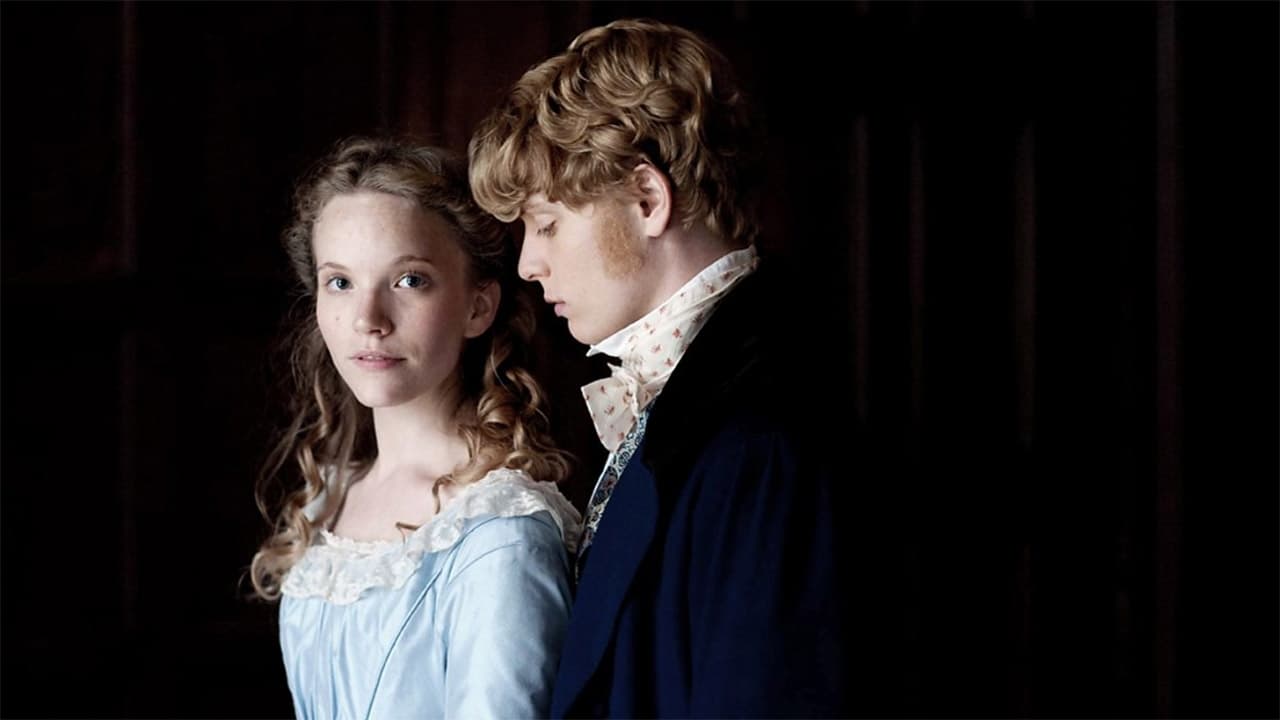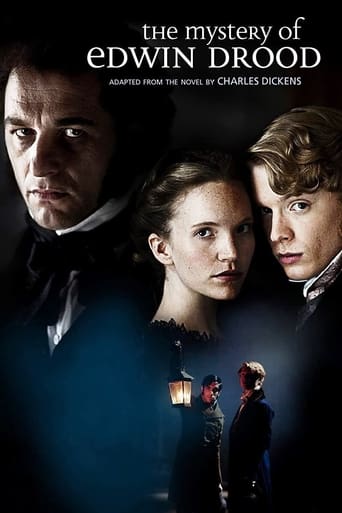

"The Mystery of Edwin Drood" was Dickens's last novel, famous for being left unfinished at his death, so producing a film adaptation is always going to be a speculative undertaking, as nobody is quite sure how Dickens intended it to end, although there are a number of theories. The title character is a young man from the cathedral city of Cloisterham, a thinly-disguised version of Rochester. (The film was shot on location in that city). The plot revolves around the strange triangular relationship which develops between Edwin, his fiancée Rosa Bud, and his uncle John Jasper. Edwin has been engaged to Rosa since they were both children, as a result of provisions in their father's wills, but neither seems to have much passion for the other. Jasper, the opium-addicted choirmaster of Cloisterham Cathedral, is secretly in love with Rosa, although she does not return his love. A further development comes with the arrival in Cloisterham of the twins Neville and Helena Landless from Ceylon. In this adaptation they are of mixed race, although their racial origins are not indicated in the original book. Neville finds himself attracted to Rosa, and he and Edwin fall out with one another. Another important character is the clergyman Septimus Crisparkle. The "mystery" to which Dickens alludes in his title is the sudden disappearance of Edwin. It is presumed that he has been murdered, although no body is ever found. The novel in its unfinished state offers no definitive solution to the mystery, so the writers of this version have had to come up with their own. (I won't say what it is). The film was made for BBC television, and falls within the long British tradition of visually attractive costume drama, a tradition which is even longer on television than it is in the cinema. (Feature films of this type were rare before the late sixties and relatively uncommon before the eighties). It is a good example of ensemble acting so I won't single out any individual performances. Like a number of recent adaptations of the classics it is used to put over a modern perspective on history; the Landless siblings are used to raise some points about colonialism and racism in Victorian society. (Edwin's initial dislike of Neville is partly based on race prejudice). It is, of course, anyone's guess whether the new ending is the one Dickens intended; literary buffs may suspect that it is not. The film-makers have, however, at least come up with something that makes sense on its own terms and comes across as a seamless whole; it would be difficult for anyone not acquainted with the novel to guess which parts of the story are Dickens's own and which the invention of the scriptwriter. The film is required viewing for any Dickens enthusiast and an entertaining period drama for anyone else. 7/10
... View MoreThe Mystery of Edwin Drood is both captivating and frustrating, captivating in its tension and suspense as well as the titular character and frustrating in its incompleteness. This adaptation is not perfect but does nobly with its source material. It does suffer from incompleteness(the book doesn't help) and its contrived and abrupt ending. But it is very handsomely filmed and remarkably authentic to the period it's set in, while the score is unobtrusive and hauntingly beautiful. The dialogue is carefully and intelligently adapted, making an effort to sound Dickenesian and not too contemporary, also nobly developing the characters in rich detail. The story is tense and suspenseful, with some good twists and turns and very compelling storytelling, more so in the first half admittedly. It is a very well-performed adaptation too, Matthew Rhys steals the show, intense and heartfelt it is a brilliant performance. Freddie Fox shows command of the Dickenesian language, Tamzin Merchant is appealingly pert and Rory Kinnear, Ian McNeise, Julia MacKenzie and Alun Armstrong turn in strongly dependable performances too. In conclusion, solid and very well-done especially for the performances. 8/10 Bethany Cox
... View MoreUsually BBC adaptations are outstanding; this one lacked something. As it is Dickens unfinished work it is hard to know if it was a failure on his part in the overall conception or whether the writer and director of this version just was not able to intuit where Dickens was taking this story.The acting is good and Mathew Rhys (Brothers and Sisters) is suitably menacing as the opium raddled John Jasper. Freddie Fox is also good as the eponymous Drood, spoiled and totally self absorbed.The arrival of the Ceylonese brother and sister provides one of the more interesting plot possibilities, but somehow the anger of the brother is never that convincing.In the end, watching the final climax, it was possible to see exactly how it was going to end, and it ended as predicted. There was a feeling of, 'oh is that it?' A missed opportunity or maybe the book was never really worth finishing.
... View MoreI haven't read The Mystery of Edwin Drood yet and it has now moved up the list of Dickens books that I want to read. I'd love to see where he left off and where the screenwriter had to fill in the gaps. From that standpoint, I have nothing to say about how this production was adapted.This was a brilliant production, however. Matthew Rhys was astounding - at the beginning of the first part his character had some moments of charisma (well, one, perhaps when he was singing to the choir and demonstrating flat and sharp keys) but this didn't last when he spiralled downwards into his obsessions and became a truly awful character but very sympathetic at the same time. Truly rounded.On an aesthetic note, some costume dramas have distractingly bad hair (I loved Sandy's Welch's Jane Eyre but Toby Stephen's hair was not good for example) - 'Drood' has none of this - I completely believed everyone's appearance and was not distracted by poor hairpieces for once (minor point but I wanted to praise that aspect!).Another notable point about this production was the sound. It was more creative than any other costume drama I can remember - some of the audio had me guessing whether they were original sound recordings from the church or a post-production echo chamber - I really couldn't tell the difference. Then the audio-montages that accompanied the more drug- induced scenes were creatively mixed and really took me into the aural world of 'Drood'.I absolutely loved this. Thank you once again, BBC.
... View More